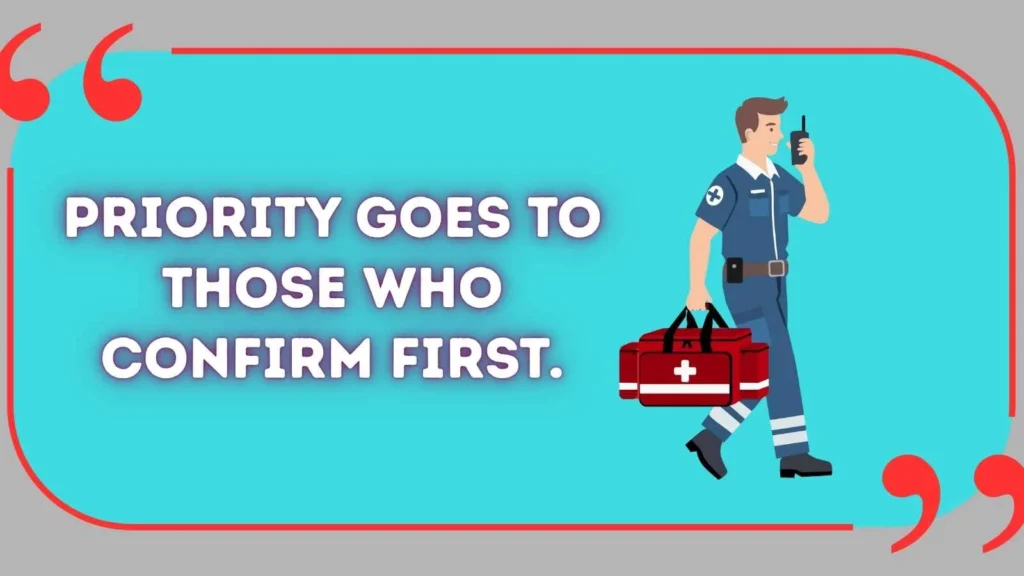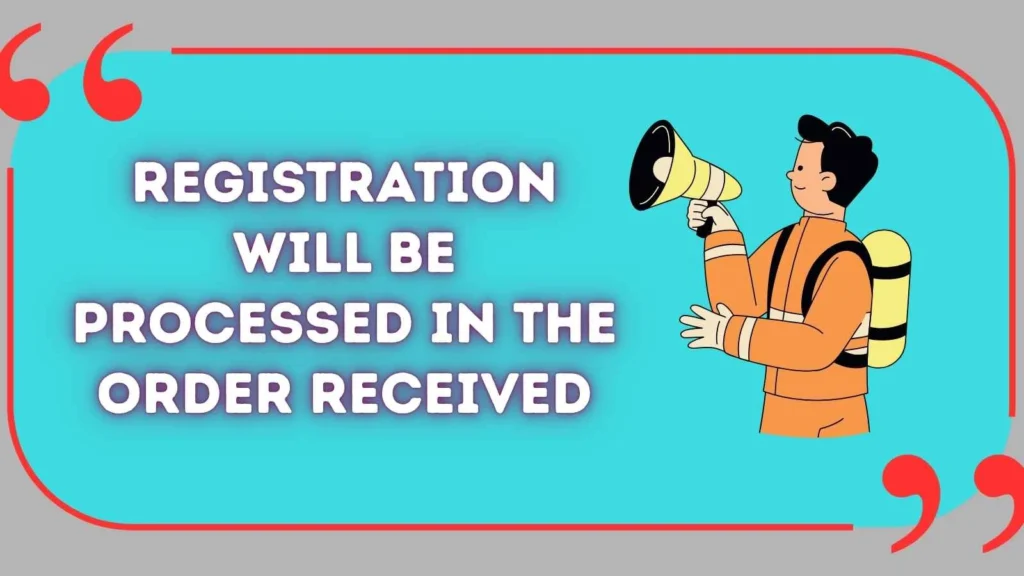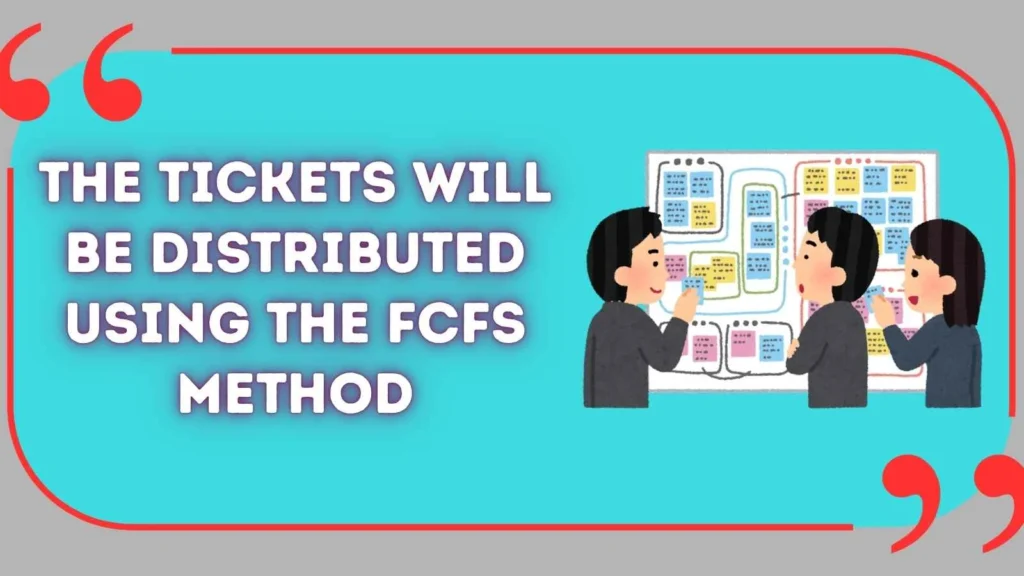Last updated on October 16th, 2025 at 12:17 pm
The phrase “first come, first serve” is commonly used to indicate that something is available on a priority basis, meaning the earliest individuals to arrive or request will receive the benefit.
While this phrase is widely understood, using alternative expressions can add variety and professionalism to your writing or speech.
Whether you’re crafting a business announcement, an event invite, or a promotional message, switching up your wording can enhance clarity and engagement.
In this article, we’ll explore 21 other ways to say “first come, first serve”, along with their meanings, descriptions, and practical usage examples.
21 Other Ways to Say “First Come, First Serve”
- First come, first served
- While supplies last
- Limited availability
- Act fast
- Early bird gets the worm
- Subject to availability
- Available until gone
- Only while stock lasts
- No reservations
- Get it while it lasts
- Seize the opportunity
- Grab it before it’s gone
- First in, first out
- Come early to secure your spot
- Doors open at (time), don’t be late
- Limited slots available
- Hurry, before it’s too late
- Be the first in line
- Rolling basis
- Priority given to early arrivals
- Snag your spot now
1. First Come, First Served
Definition: The correct grammatical form of “first come, first serve,” indicating that service is provided in order of arrival.
Description: This is a more grammatically precise version of the phrase, emphasizing that those who arrive first will be served before others.
Usage Examples:
- Tickets are distributed on a first come, first served basis.
- The restaurant operates first come, first served—no reservations allowed.
2. While Supplies Last
Definition: Items or offers are available until they run out.
Description: Commonly used in marketing and promotions, this phrase encourages urgency by indicating that stock is limited.
Usage Examples:
- Get your free sample while supplies last!
- The discount is valid while supplies last, so shop now.
3. Limited Availability
Definition: The number of items or spots is restricted.
Description: This phrase works well for exclusive offers, reservations, or products with low stock.
Usage Examples:
- Our VIP seats have limited availability—book now!
- Due to limited availability, we recommend reserving early.
4. Act Fast
Definition: A call to action urging people to make a decision quickly.
Description: Often used in advertising, it creates a sense of urgency for the audience.
Usage Examples:
- These deals won’t last long—act fast!
- Act fast before all spots are taken!
5. Early Bird Gets the Worm
Definition: Those who act first receive the best rewards.
Description: This idiom suggests that those who arrive early or take action sooner have a competitive advantage.
Usage Examples:
- The early bird gets the worm, so register today!
- Don’t wait—the early bird gets the worm in our exclusive sale.
6. Subject to Availability
Definition: Offer or service depends on whether spots or stock remain.
Description: This phrase is formal and commonly used in reservations, hotels, and sales.
Usage Examples:
- Room upgrades are subject to availability at check-in.
- Discounts apply subject to availability.
7. Available Until Gone
Definition: Once it runs out, it’s no longer available.
Description: This phrase highlights the limited nature of a product or opportunity.
Usage Examples:
- The offer is available until gone—don’t miss out!
- These exclusive gifts are available until gone.
8. Only While Stock Lasts
Definition: The offer remains until inventory runs out.
Description: Often used for sales, giveaways, and limited-edition products.
Usage Examples:
- Buy one, get one free only while stock lasts!
- Limited edition sneakers are only while stock lasts.
9. No Reservations
Definition: Service is given on a walk-in basis.
Description: Used for restaurants, events, and promotions where prior booking is not allowed.
Usage Examples:
- We operate on a no reservations policy—first come, first served.
- Entry is no reservations, so arrive early!
10. Get It While It Lasts
Definition: Encourages immediate action before something disappears.
Description: This phrase is casual and works well in retail or marketing.
Usage Examples:
- Limited stock—get it while it lasts!
- This deal won’t last forever—get it while it lasts!
11. Seize the Opportunity
Definition: Act quickly before missing out.
Description: This phrase adds a motivational tone.
Usage Examples:
- Seize the opportunity and sign up today!
- Don’t wait—seize the opportunity before it’s gone.
12. Grab It Before It’s Gone
Definition: Something will disappear soon.
Description: This phrase adds excitement and urgency.
Usage Examples:
- Grab it before it’s gone—these are selling fast!
- Limited tickets—grab it before it’s gone!
13. First In, First Out
Definition: Those who arrive earliest get priority.
Description: Used for queues, stock management, and limited access events.
Usage Examples:
- Our food service is first in, first out.
- The warehouse follows a first in, first out policy.
14. Come Early to Secure Your Spot
Definition: Encourages early arrival for guaranteed entry.
Usage Examples:
- Come early to secure your spot—space is limited!
- Come early to secure your spot at the concert.
15. Doors Open at (Time), Don’t Be Late
Definition: Specifies when entry begins, warning against late arrival.
Usage Examples:
- Doors open at 7 PM, don’t be late!
- The sale starts soon—doors open at 9 AM!
16. Limited Slots Available
Definition: There are only a few spots open.
Usage Examples:
- Register now—limited slots available!
- Limited slots available for our coaching program.
17. Hurry, Before It’s Too Late
Definition: Urging immediate action because time is running out.
Description: This phrase emphasizes the immediacy of the situation, encouraging people to act before it’s too late to secure their spot or benefit. It’s effective in creating a sense of urgency.
Usage Examples:
- Hurry, before it’s too late to get your tickets!
- Our limited-time offer ends soon—hurry, before it’s too late!
18. Be the First in Line
Definition: Suggests that those who act first will have priority access.
Description: This phrase is often used for events, product releases, or services that require timely action. It appeals to those who want to be at the front of the queue.
Usage Examples:
- Be the first in line to get our new collection!
- Be the first in line to secure your spot at the exclusive event!
19. Rolling Basis
Definition: Indicates that something is available continually based on the order of arrival or availability.
Description: Often used for open enrollment or applications where items or opportunities are made available on an ongoing basis, but still dependent on early action.
Usage Examples:
- Applications are reviewed on a rolling basis—apply today!
- We process orders on a rolling basis, so act quickly!
20. Priority Given to Early Arrivals
Definition: Those who arrive first will be given first priority.
Description: This phrase ensures people understand that arriving early increases their chances of receiving the service, product, or entry they desire.
Usage Examples:
- Priority given to early arrivals—arrive before 10 AM to secure your spot!
- At our event, priority is given to early arrivals for exclusive access.
21. Snag Your Spot Now
Definition: An informal call to action encouraging people to secure their spot immediately.
Description: This phrase is effective in events and promotions, suggesting that spots are limited and emphasizing that immediate action is necessary to avoid missing out.
Usage Examples:
- Snag your spot now—limited seats available!
- Snag your spot now for the exclusive webinar!
🟩 Other Ways to Say “First Come, First Serve” to Someone

Definition:
💬 This phrase means that whoever arrives or acts first receives the opportunity or benefit before others.
Description:
✨ When speaking directly to someone, you can use alternative phrases that sound friendly yet clear. Moreover, these variations keep your tone polite and conversational. Consequently, they help you maintain professionalism while expressing fairness and urgency.
Usage Examples:
🔹 “It’s on a first-in basis.”
🔹 “Availability is limited — act fast!”
🔹 “Spots are given to early responders.”
🔹 “Priority goes to those who confirm first.”
🟦 Other Ways to Say “First Come, First Serve” in an Email
Definition:
💬 This phrase communicates that opportunities or slots will be given in the order of response within professional email communication.
Description:
💡 In email writing, it’s better to use courteous and polished alternatives. Furthermore, professional phrasing helps your message sound respectful and organized. Therefore, using clear expressions ensures the recipient understands the urgency without sounding abrupt.
Usage Examples:
🔹 “Opportunities will be allocated on a first-response basis.”
🔹 “Spaces are available while supplies last.”
🔹 “Enrollment is handled in order of registration.”
🔹 “Reservations will be confirmed based on response time.”
🟨 Professional Way to Say “First-Come, First-Serve” in an Email

Definition:
💬 A professional variation of this phrase conveys fairness and urgency in a polished, business-appropriate tone.
Description:
🌟 In business or corporate emails, professionalism and clarity are essential. Thus, replacing “first-come, first-serve” with refined alternatives ensures your message sounds courteous and efficient. Additionally, these versions work well in invitations, sign-ups, and event notices.
Usage Examples:
🔹 “Registration will be processed in the order received.”
🔹 “Selection will be made on a rolling basis.”
🔹 “Requests will be handled sequentially as they arrive.”
🔹 “Seats will be confirmed based on the time of submission.”
🟧 “First Come, First Serve” Acronym

Definition:
💬 The common acronym for “First Come, First Serve” is FCFS — a shorthand used in scheduling, logistics, and event management.
Description:
⚙️ The acronym FCFS simplifies communication when referring to queue-based systems or order-based opportunities. Moreover, it helps maintain concise writing, especially in technical or business contexts. As a result, it’s widely used in operations, customer service, and computing environments.
Usage Examples:
🔹 “The tickets will be distributed using the FCFS method.”
🔹 “Assignments are processed according to the FCFS policy.”
🔹 “This event follows an FCFS registration system.”
🟪 “First Come, First Serve” or “First Come, First Served”?
Definition:
💬 The grammatically correct phrase is “First Come, First Served”, meaning the first person to arrive will be the first to be served.
Description:
🧠 The confusion arises because “serve” and “served” sound similar in casual conversation. However, “served” is correct since it functions as the past participle, implying those who come first are served first. Therefore, “First Come, First Served” is preferred in both professional and written contexts.
Usage Examples:
🔹 Correct: “The offer is available on a first-come, first-served basis.”
🔹 Incorrect: “The offer is available on a first-come, first-serve basis.”
🔹 “Tickets are limited, so it’s first-come, first-served!”
Conclusion:
When it comes to “first come, first serve,” there are many alternative ways to express the same idea in everyday conversation.
Phrases like “it’s a race,” “whoever gets there first,” or “first in line” all convey the same urgency and fairness.
Using these variations adds variety to your language and helps keep communication clear and engaging.
Whether you’re explaining a queue or setting up a system, using different ways to say “first come, first serve” can make your speech sound more natural and conversational.
